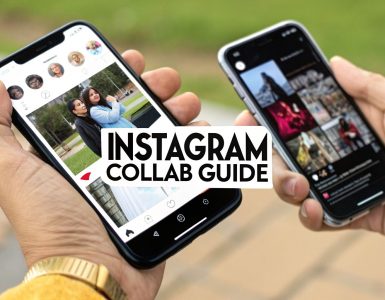Juggling multiple social media accounts manually is a direct path to inefficiency and missed opportunities. The core challenge isn't just posting content; it's about scheduling consistently, engaging with your audience in real-time, and analyzing performance data to refine your strategy. Without a centralized system, these tasks become fragmented, time-consuming, and difficult to measure, ultimately hindering your brand's growth and diluting your marketing efforts. The right platform solves this by unifying your workflow into a single, powerful command center.
This guide is designed to help you find that command center. We've moved beyond surface-level descriptions to provide a comprehensive analysis of the best social media management tools available today. For each platform, you'll find an honest assessment of its strengths, weaknesses, and ideal use cases. We dig into specific features, from advanced analytics suites to team collaboration workflows, to give you a clear picture of how each tool operates in a real-world setting.
Whether you're a small business owner looking for an affordable scheduler, a content creator focused on visual platforms like Instagram, or a marketing agency managing a dozen clients, this resource will equip you to make an informed decision. We provide practical insights, screenshots, and direct links to each tool, allowing you to compare options efficiently and select the platform that best aligns with your budget, team size, and strategic goals. We've done the heavy lifting so you can get back to what matters: building meaningful connections with your audience.
1. EvergreenFeed
EvergreenFeed carves out a unique and powerful niche within the landscape of social media management tools by focusing on one critical task: automating evergreen content. Rather than trying to be an all-in-one suite, it perfects the art of continuously recycling your most valuable, non-time-sensitive content, such as foundational blog posts, timeless tips, and popular quotes. This focused approach ensures your social media profiles remain consistently active and engaging without requiring constant manual intervention.
The platform's primary strength lies in its seamless integration with Buffer. By connecting to your existing Buffer account, EvergreenFeed allows you to create customizable "content buckets." This system is remarkably effective for organizing content by theme, format, or campaign, giving you granular control over what gets posted and when.
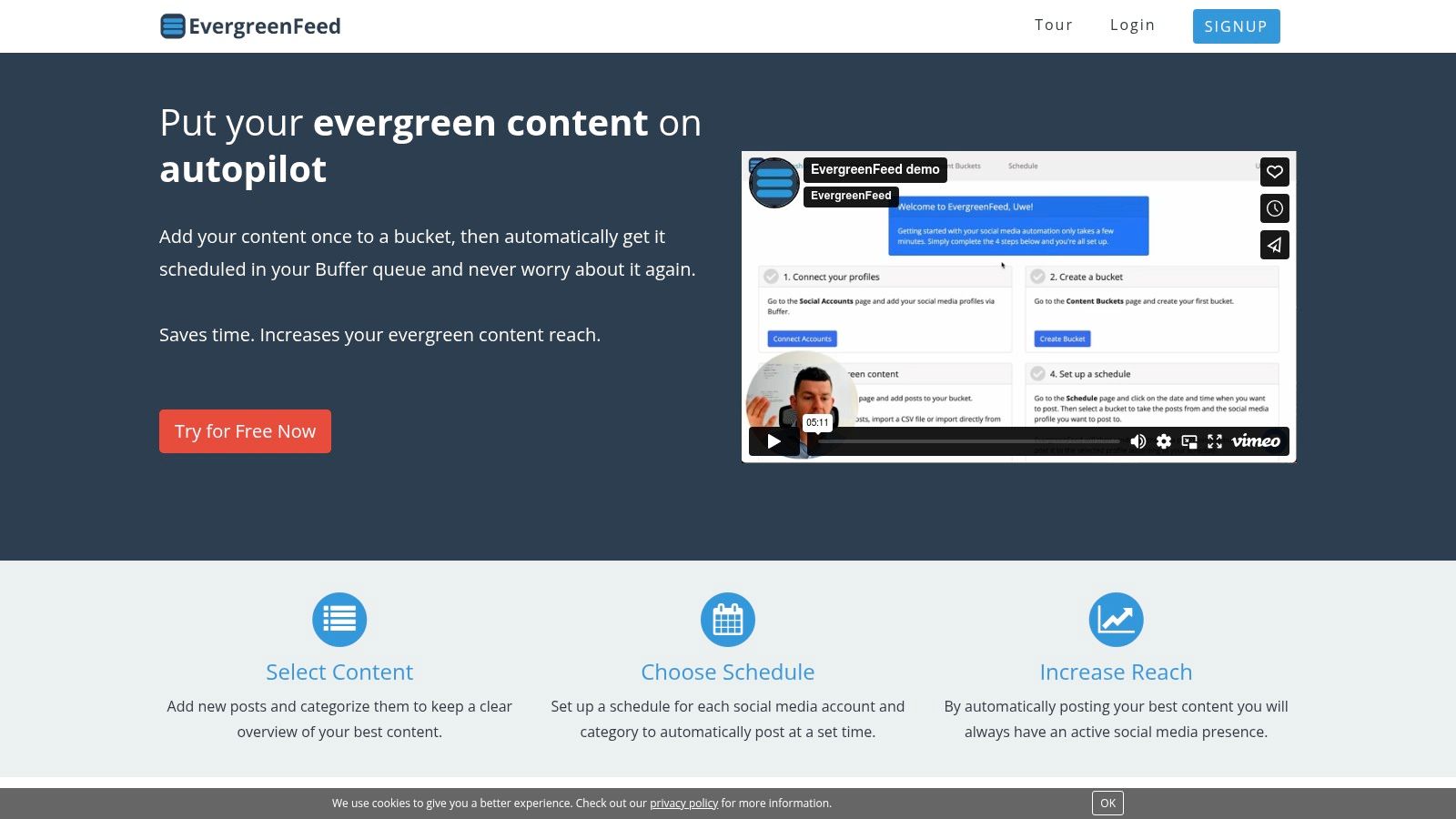
This intelligent scheduling is what makes EvergreenFeed one of the best social media management tools for time-strapped professionals. It frees you from the repetitive task of manually re-adding your best content to your queue, a process that user testimonials confirm saves upwards of seven hours per week. For more insights into optimizing this workflow, EvergreenFeed offers an excellent social media automation guide that details advanced strategies.
Standout Features and Use Cases
- Content Buckets: Organize your content into distinct categories (e.g., Blog Posts, Case Studies, Industry News). You can then set a specific schedule for each bucket to post to different social accounts, ensuring a balanced and varied content mix. For example, you can schedule your "Promotions" bucket to post only on Fridays, while your "Blog Posts" bucket posts twice daily.
- Intelligent Automation: The tool automatically selects a post from your designated buckets to fill your Buffer queue. This ensures your profiles never go silent and your evergreen content gets the repeated exposure it deserves.
- Multi-Account Management: The platform supports multiple Buffer accounts, making it an ideal solution for marketing agencies or social media managers handling several clients from a single, intuitive dashboard.
Pros and Cons
| Pros | Cons |
|---|---|
| Saves immense time by automating the recycling of high-value evergreen content. | Dependent on Buffer, requiring an active Buffer account for functionality. |
| Customizable schedules per content bucket provide precise control over your content calendar. | Advanced analytics and features are reserved for paid tiers. |
| User-friendly interface simplifies the process of setting up and managing automation rules. | Best suited for evergreen content; not a tool for managing real-time conversations. |
| Risk-free trial with a free signup that does not require a credit card. |
Who Is It For?
EvergreenFeed is a perfect fit for content creators, bloggers, and businesses whose strategy relies heavily on a library of evergreen content. If your primary goal is to maximize the lifespan and reach of your existing articles, guides, and resources with minimal effort, this tool is an invaluable asset.
Website: https://www.evergreenfeed.com
2. Hootsuite
Hootsuite is one of the most established and comprehensive platforms in the social media management space, making it a powerful choice for organizations of all sizes, particularly those with complex team workflows. It provides a robust, all-in-one dashboard to manage publishing, engagement, analytics, and social listening. Its longevity in the market means it has developed a mature feature set that can handle demanding, enterprise-level requirements.
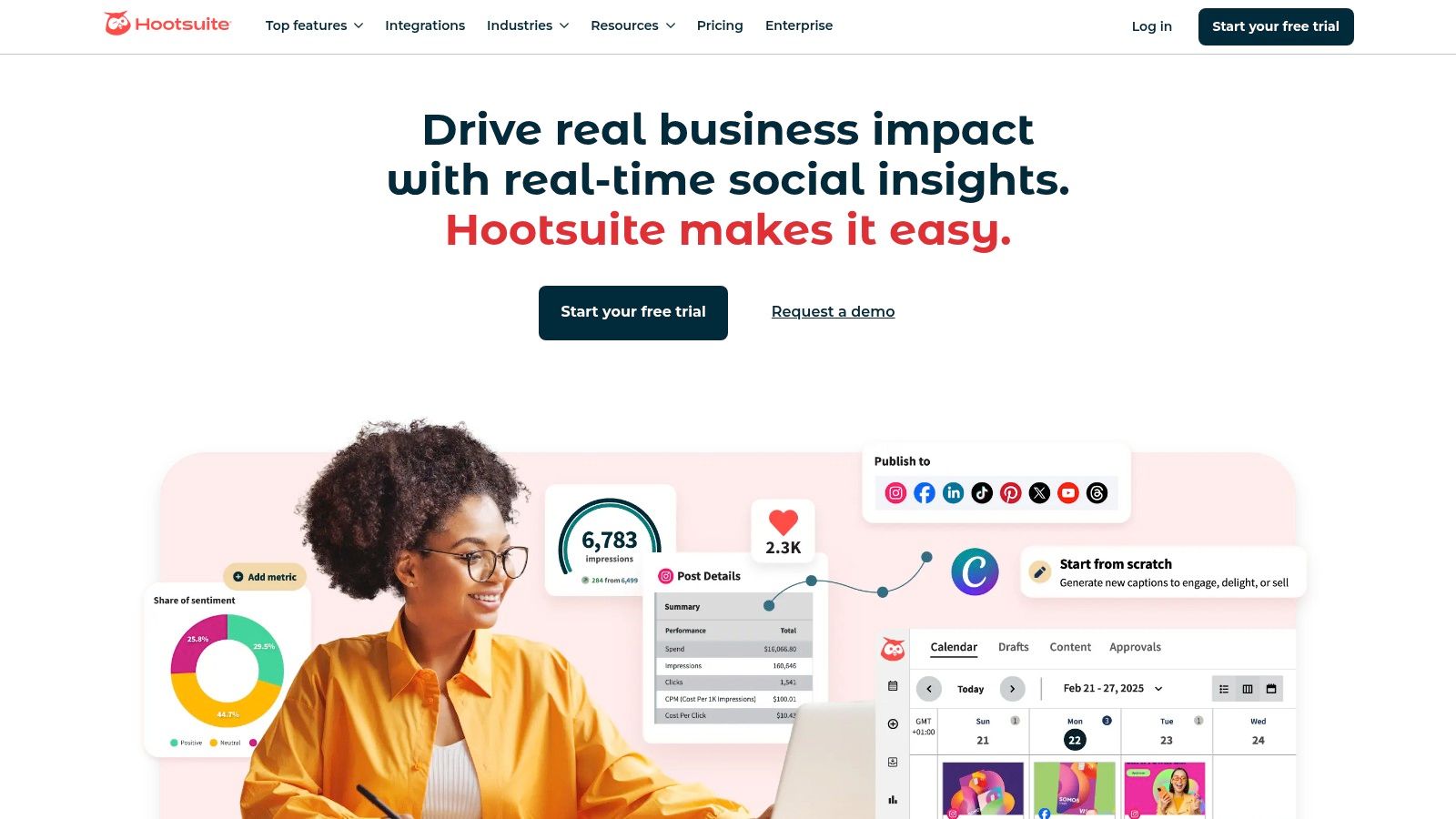
The platform truly shines in its ability to support team collaboration and governance. Features like detailed approval workflows, asset libraries, and message routing ensure brand consistency and efficient operations, which is crucial for larger marketing departments or agencies managing multiple client accounts. While the interface can feel complex initially due to its sheer depth of functionality, its power is undeniable once mastered. This makes it one of the best social media management tools for teams needing strict controls and scalable processes.
Key Details & Use Case
- Best For: Large teams and enterprises needing advanced collaboration, governance, and in-depth analytics.
- Pricing: Plans start at $99 per month for the Professional tier. The Team and custom Enterprise plans add more users and advanced features, but costs can escalate quickly.
- Unique Feature: Its analytics suite offers powerful competitive and industry benchmarking, allowing you to compare your performance against others in your sector directly within the platform.
Pros:
- Enterprise-grade feature set and extensive app integrations.
- Sophisticated analytics and customizable reporting.
- Strong team collaboration and approval workflows.
Cons:
- Can be expensive, especially as you add users and features.
- The user interface has a significant learning curve.
Website: https://www.hootsuite.com
3. Sprout Social
Sprout Social positions itself as a premium, all-in-one platform engineered for businesses that prioritize sophisticated team collaboration and data-driven strategy. It excels in unifying publishing, analytics, and engagement into a polished, user-friendly interface. The platform is designed to scale, accommodating the needs of growing teams and enabling cross-functional collaboration between marketing, sales, and customer care departments with ease.
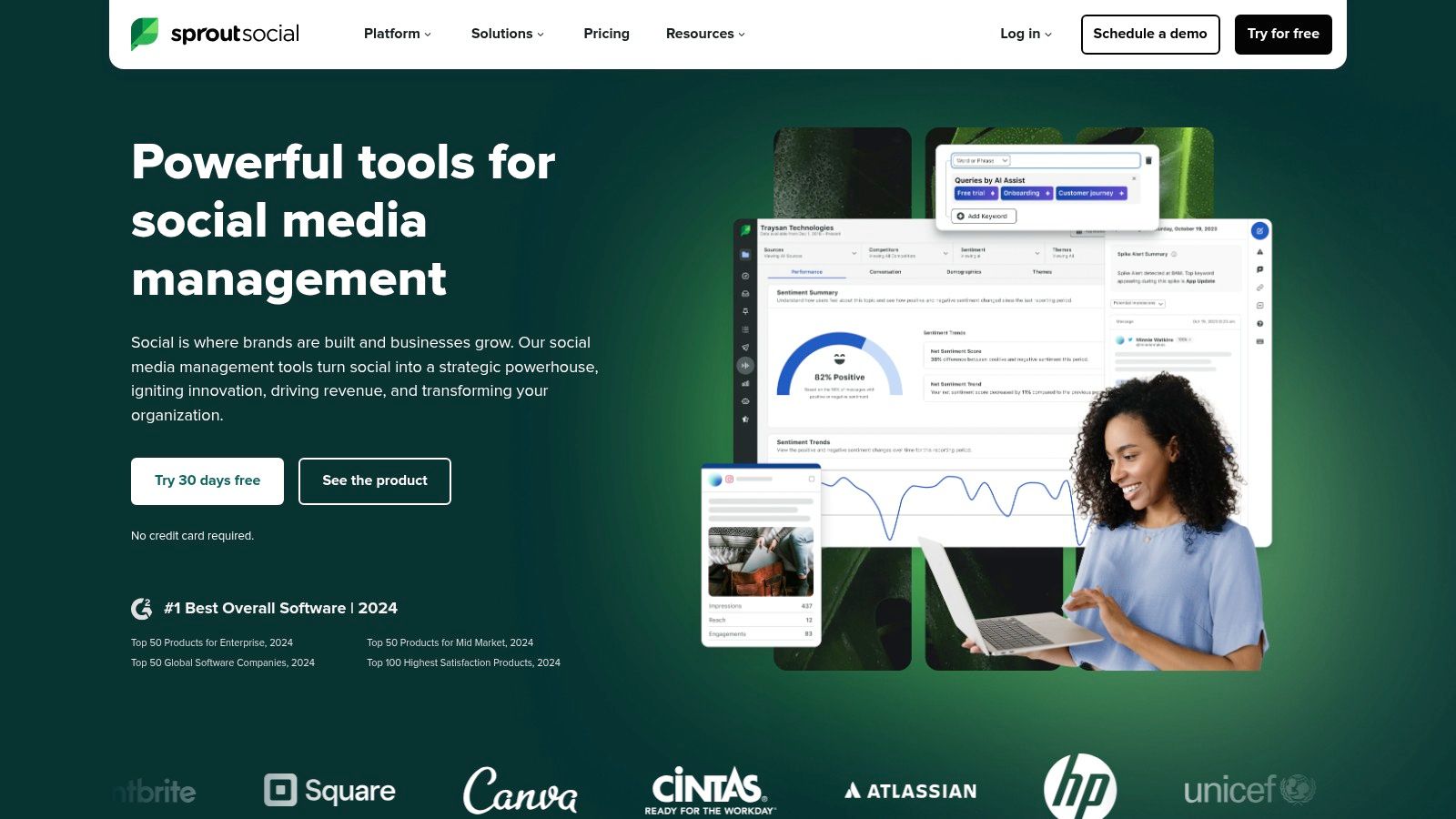
Where Sprout Social truly sets itself apart is in its powerful reporting and analytics capabilities, combined with a robust system for managing customer interactions. The Smart Inbox centralizes messages from all connected profiles, allowing teams to tag, filter, and assign conversations efficiently. This focus on both performance metrics and customer care makes it one of the best social media management tools for brands that view social media as a core pillar of their customer experience and business intelligence efforts. Its intuitive design ensures that even complex features are accessible, reducing the learning curve for new team members.
Key Details & Use Case
- Best For: Mid-market to enterprise businesses needing a scalable solution for team collaboration, customer care, and in-depth, presentation-ready analytics.
- Pricing: Plans begin at $249 per month for the Standard tier. The Professional and Advanced plans add more sophisticated features, but the per-seat pricing is higher than many SMB-focused tools.
- Unique Feature: The unified Smart Inbox includes advanced CRM-like functionalities, such as conversation history and automated routing, turning social engagement into a structured customer care workflow.
Pros:
- Excellent reporting and analytics with stakeholder-ready exports.
- Scales well for cross-functional teams and customer care.
- Consistently reviewed as easy to administer and use at scale.
Cons:
- Higher per-user pricing compared to many competitors.
- Advanced listening and employee advocacy features are expensive add-ons.
Website: https://sproutsocial.com
4. Buffer
Buffer is a highly regarded social media management tool celebrated for its simplicity, intuitive interface, and affordability. It is a fantastic entry point for small businesses, creators, and marketers who need a straightforward way to plan, schedule, and publish content without the complexity of enterprise-level software. Its clean design and user-friendly workflow make it incredibly easy to get started, allowing users to build a consistent posting cadence quickly.
The platform's strength lies in its core publishing features, including a visual content calendar, a simple posting queue, and first-comment scheduling for platforms like Instagram. Buffer strips away the overwhelming extras found in more complex tools, focusing on doing the essentials exceptionally well. This makes it one of the best social media management tools for those who prioritize ease of use and an uncluttered experience. For a deeper dive, you can learn more about using Buffer in this step-by-step guide to using Buffer for your social media.
Key Details & Use Case
- Best For: Small businesses, creators, and agencies looking for an easy-to-use, affordable scheduling tool.
- Pricing: A generous free plan is available. Paid plans start at $6 per month per channel, with team plans offering unlimited users.
- Unique Feature: Its AI Assistant helps brainstorm ideas, rephrase text, and generate content directly within the composer, streamlining the content creation process for users who need a creative boost.
Pros:
- Extremely low entry price and a forgiving learning curve.
- Transparent, "add-only-what-you-need" pricing model.
- Excellent customer support reputation for SMBs.
Cons:
- Advanced analytics and collaboration tools are gated behind higher-priced plans.
- Less depth in social listening features compared to enterprise-focused suites.
Website: https://buffer.com
5. Later
Later has carved out a powerful niche by focusing on visual-first social media platforms, making it an indispensable tool for brands where aesthetics are paramount. Initially famous for its Instagram scheduling, it has evolved into a comprehensive platform for visually planning content across Instagram, TikTok, and Pinterest. Its core strength lies in its visual content calendar, which allows users to drag and drop media to see exactly how their feed will look before publishing.
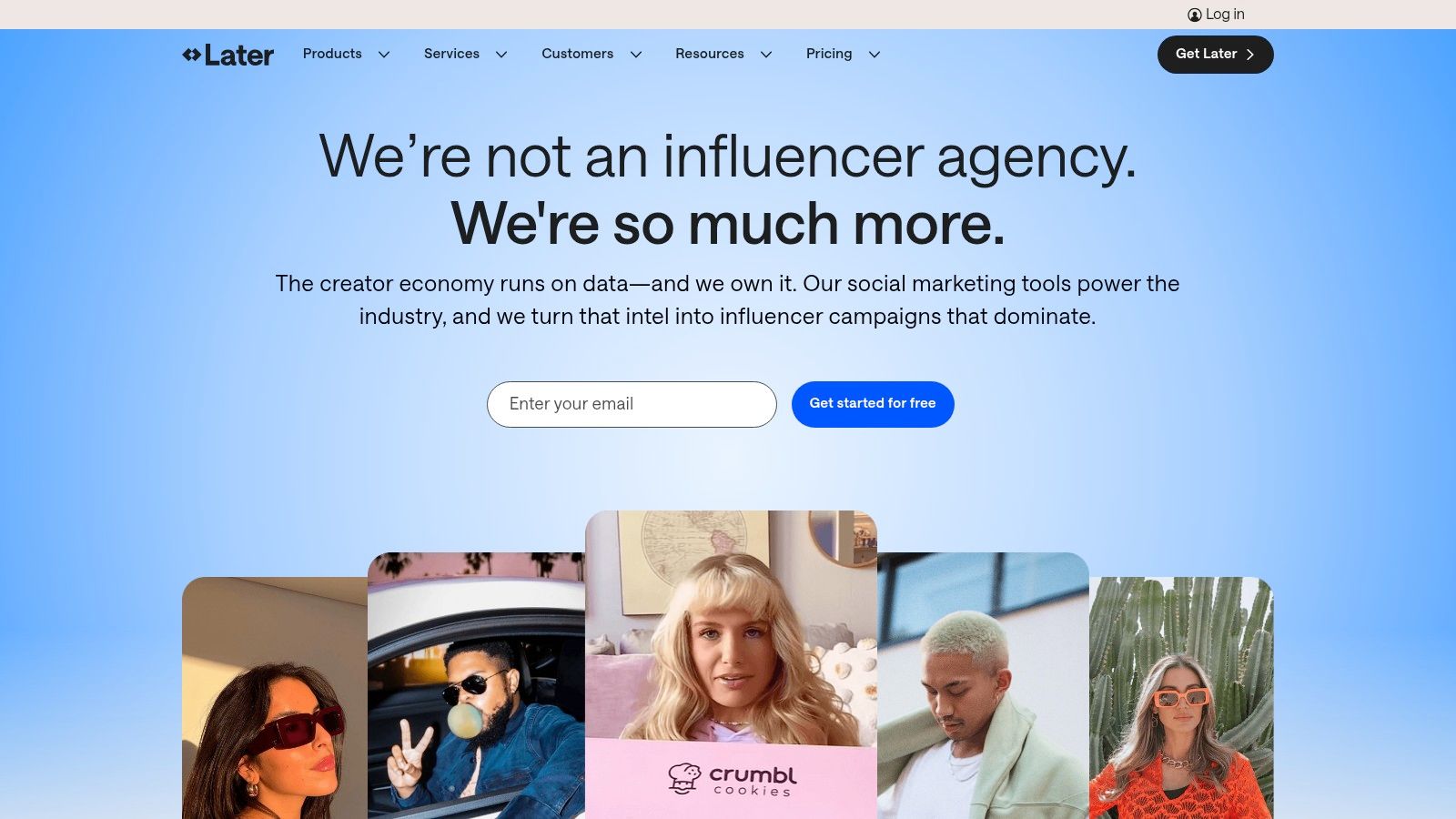
The platform goes beyond simple scheduling by integrating key features that visual creators need, such as a "Link in Bio" tool to create a clickable landing page from your profile and tools for collecting user-generated content (UGC). This tight integration makes it one of the best social media management tools for e-commerce brands, influencers, and businesses that rely heavily on visual storytelling. While it supports other networks like Facebook, its feature set is undeniably optimized for a visual-centric workflow.
Key Details & Use Case
- Best For: Brands, creators, and marketers focused on Instagram, TikTok, and Pinterest.
- Pricing: A free plan is available for individuals. Paid plans start at $25 per month for the Starter tier, with Growth and Advanced tiers offering more users and features.
- Unique Feature: The intuitive Visual Planner provides a drag-and-drop interface to preview and arrange your Instagram feed, ensuring a cohesive and on-brand aesthetic before posts go live.
Pros:
- Excellent for Instagram and TikTok-heavy workflows.
- Intuitive and user-friendly visual planning experience.
- Integrated Link in Bio and UGC collection tools.
Cons:
- Lighter on features for non-visual platforms like X (formerly Twitter) and LinkedIn.
- Advanced analytics and collaboration features are reserved for higher-tier plans.
Website: https://later.com
6. Agorapulse
Agorapulse is a powerful, end-to-end social media management tool that excels in community management and ROI measurement. It offers a comprehensive suite of features for publishing, monitoring, and reporting, all wrapped in a user-friendly interface. The platform is particularly well-suited for agencies and teams that need to demonstrate clear business value from their social media efforts, making it a strong contender among the best social media management tools available today.
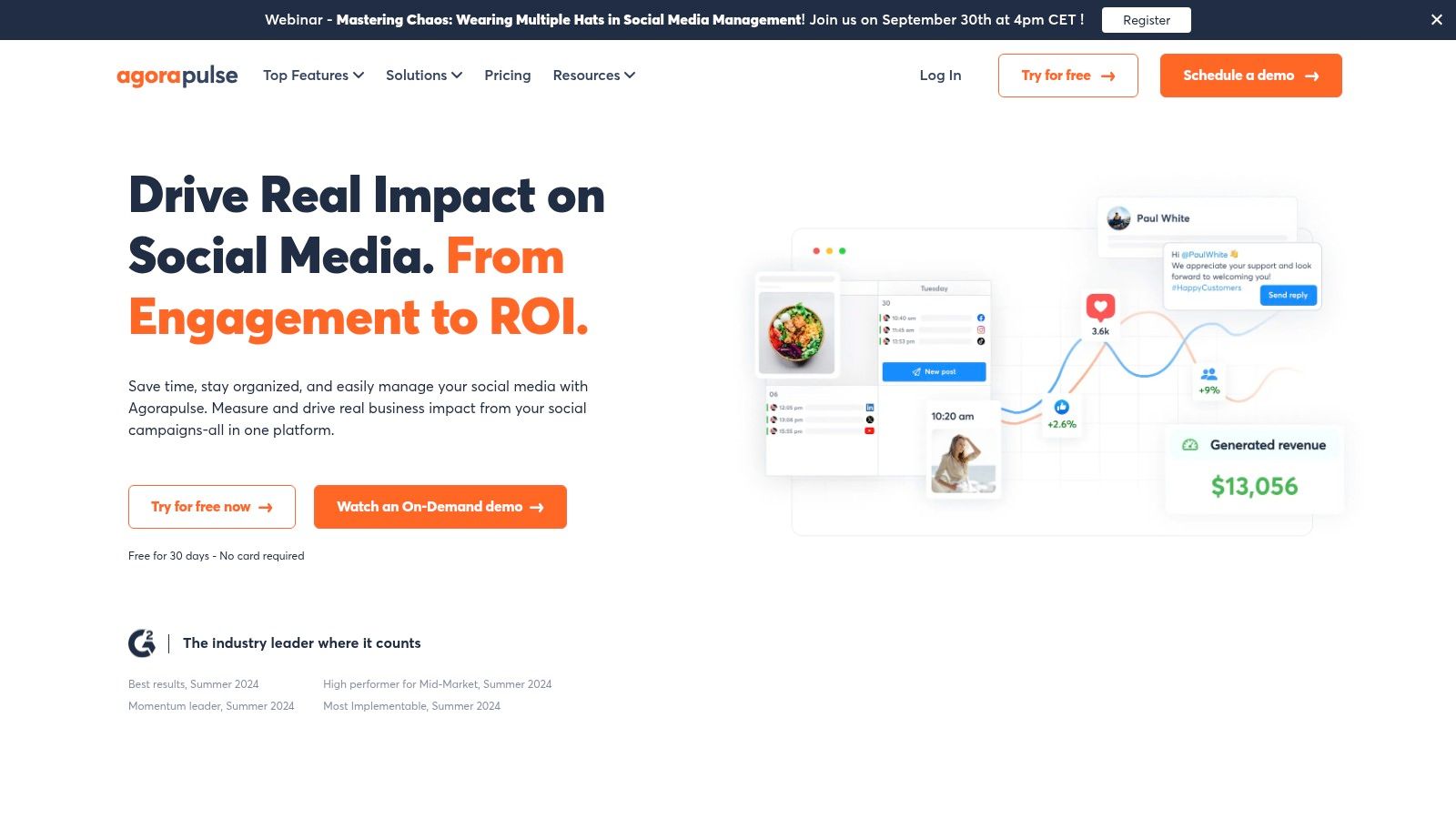
Where Agorapulse truly differentiates itself is through its robust unified inbox and detailed reporting capabilities. The inbox streamlines engagement by consolidating comments, messages, and mentions, including ad comments, and allows for automated moderation rules to save significant time. Furthermore, its ability to track conversation and link click ROI helps marketers tie social media activities directly to tangible business outcomes, providing a clear justification for their marketing spend.
Key Details & Use Case
- Best For: Marketing agencies and mid-sized businesses focused on proving ROI and streamlining team collaboration.
- Pricing: A limited free plan is available. Paid plans start at $49 per month (billed annually) for the Standard tier. Professional and Advanced plans add more users and features like ROI reporting.
- Unique Feature: Its social media ROI reporting connects directly with Google Analytics to track leads and conversions generated from specific posts, providing clear financial metrics on campaign success.
Pros:
- Excellent unified inbox with ad comment moderation.
- Strong ROI and team performance reporting features.
- Solid agency workflow support, including shared calendars and Canva integration.
Cons:
- Per-user pricing can become costly for larger teams on higher tiers.
- Some advanced inbox and ad-level features are limited to more expensive plans.
Website: https://www.agorapulse.com
7. SocialPilot
SocialPilot has carved out a significant niche by offering a powerful, yet remarkably cost-effective, solution for small to mid-sized businesses (SMBs) and marketing agencies. It delivers core social media management functionalities like advanced scheduling, content curation, and analytics without the enterprise-level price tag. Its straightforward interface and efficient workflows make it a go-to for teams that need to manage a high volume of social accounts without a steep learning curve or excessive costs.
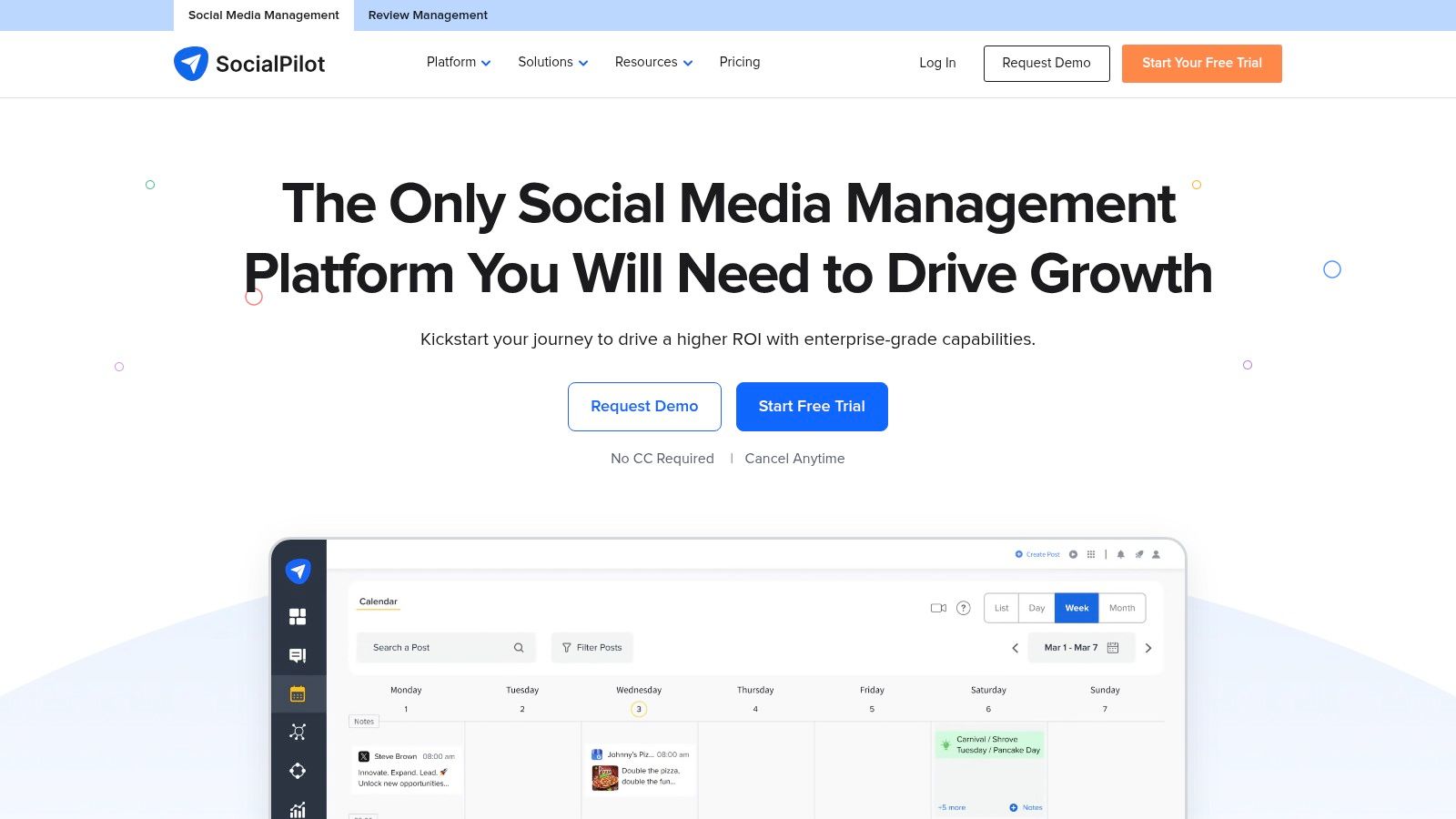
The platform's main appeal lies in its value proposition, particularly for agencies. Features like white-label PDF reports, client management tools, and bulk scheduling offer agencies the ability to scale their services efficiently. While it may not have the deep social listening or advanced automation of more expensive competitors, it excels at the fundamentals. For organizations prioritizing budget and ease of use, SocialPilot is one of the best social media management tools available, providing a robust feature set that supports significant growth. If you're exploring scheduling options, you can learn more about social media schedulers to see how they compare.
Key Details & Use Case
- Best For: Agencies and small to medium-sized businesses needing a scalable, budget-friendly tool for publishing and reporting.
- Pricing: Plans start at $25.50 per month (billed annually) for the Professional tier. Higher tiers like Agency add more users and white-label options.
- Unique Feature: Its content curation and bulk scheduling feature allows users to upload up to 500 posts at once via a CSV file, a massive time-saver for content-heavy strategies.
Pros:
- Aggressive pricing for managing a high number of social accounts.
- Excellent for agencies with white-label and client management features.
- User-friendly interface with strong scheduling and calendar tools.
Cons:
- Lacks advanced social listening and monitoring capabilities.
- Engagement and inbox features are less robust than premium competitors.
Website: https://www.socialpilot.co
8. Loomly
Loomly is a social media management tool that emphasizes collaboration and a clear, visual content creation workflow. It is designed to guide teams from an initial idea to a published post with robust approval processes, post previews, and automated scheduling. Its clean, calendar-centric interface makes it particularly accessible for marketing teams, agencies, and brand managers who need to maintain a high-level view of their content strategy while managing the intricate details of each post.
The platform excels at simplifying the content lifecycle. It offers post ideas, a central asset library, and step-by-step guidance for creating optimized content for each platform. The approval workflows are intuitive, allowing for smooth collaboration between creators, editors, clients, and other stakeholders. This focus on a structured yet user-friendly process makes it one of the best social media management tools for growing teams who value organization and brand consistency without an overly complex system.
Key Details & Use Case
- Best For: Growing teams, marketing agencies, and non-profits needing a highly visual and collaborative content calendar with straightforward approval workflows.
- Pricing: The Base plan starts at $42 per month for 2 users and 10 accounts. Higher tiers like Standard and Advanced add more users and features like advanced analytics. A generous 50% lifetime discount is available for non-profits.
- Unique Feature: Loomly offers dynamic post ideas and inspiration, providing RSS feed content, date-related event suggestions, and social media trends directly within the content creation interface.
Pros:
- Strong price-to-seats/accounts value, especially for growing teams.
- Clear, visual workflow with client-friendly previews.
- Extensive integrations with tools like Slack, Canva, and Unsplash.
Cons:
- Lacks a deep social listening suite and offers only basic engagement functions.
- Fewer enterprise-level add-ons compared to more established competitors.
Website: https://www.loomly.com
9. Zoho Social
Zoho Social positions itself as a powerful, yet remarkably affordable, social media management platform, especially for businesses already invested in the Zoho ecosystem. It offers a comprehensive suite of tools for publishing, monitoring, and analytics, but its true strength lies in its seamless integration with other Zoho products like Zoho CRM and Zoho Desk. This allows teams to bridge the gap between social media engagement and core business functions like sales and customer support.
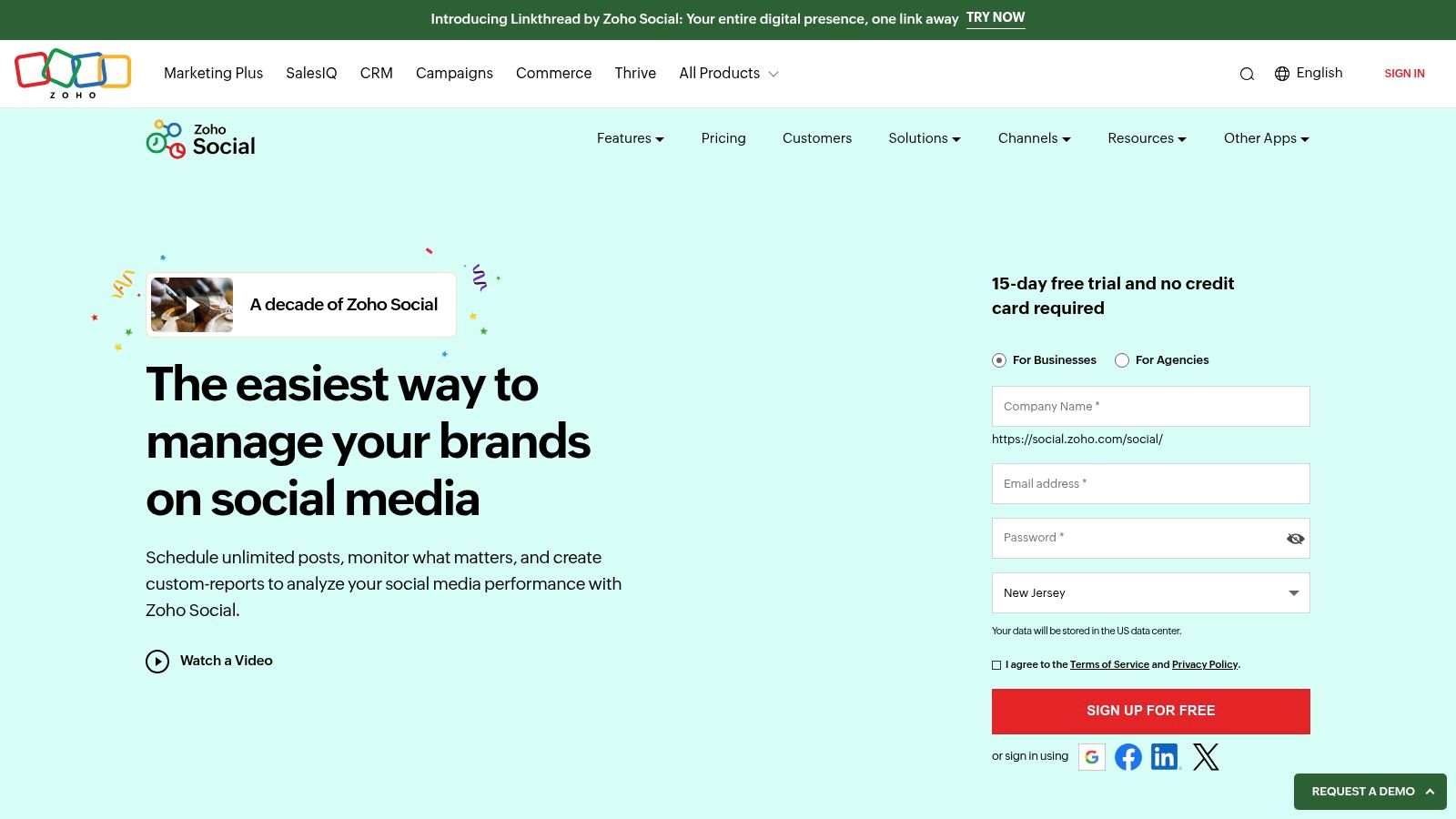
The platform is particularly well-suited for small to medium-sized businesses and agencies managing multiple brands. Its multi-brand dashboard, SmartQ scheduling (which suggests optimal posting times), and bulk scheduling features streamline content workflows efficiently. For agencies, the ability to create client portals and branded reports adds a professional touch, making Zoho Social one of the best social media management tools for demonstrating value and maintaining client relationships without breaking the budget.
Key Details & Use Case
- Best For: SMBs and agencies seeking an affordable, all-in-one tool with deep CRM and customer service integrations.
- Pricing: Plans for businesses start at $10 per month (billed annually). Agency plans with client management features begin at $200 per month (billed annually).
- Unique Feature: The native integration with Zoho CRM allows you to capture leads and add contacts directly from social media conversations, while the Zoho Desk integration lets you create support tickets from social posts.
Pros:
- Excellent value for the number of features offered.
- Seamless integration with the extensive Zoho software suite.
- Agency-specific plans include client portals and custom branding.
Cons:
- Advanced social listening and competitor analysis features are less robust than enterprise-level tools.
- Final pricing can vary by region and billing cycle, which is confirmed at checkout.
Website: https://www.zoho.com/social
10. Metricool
Metricool is an accessible yet powerful platform designed for data-driven social media managers, agencies, and creators. It combines comprehensive analytics, content planning, and competitor tracking into a single, streamlined dashboard. The platform excels at transforming raw social data into actionable insights, making it easy to generate professional reports and adjust your strategy based on real-world performance metrics.
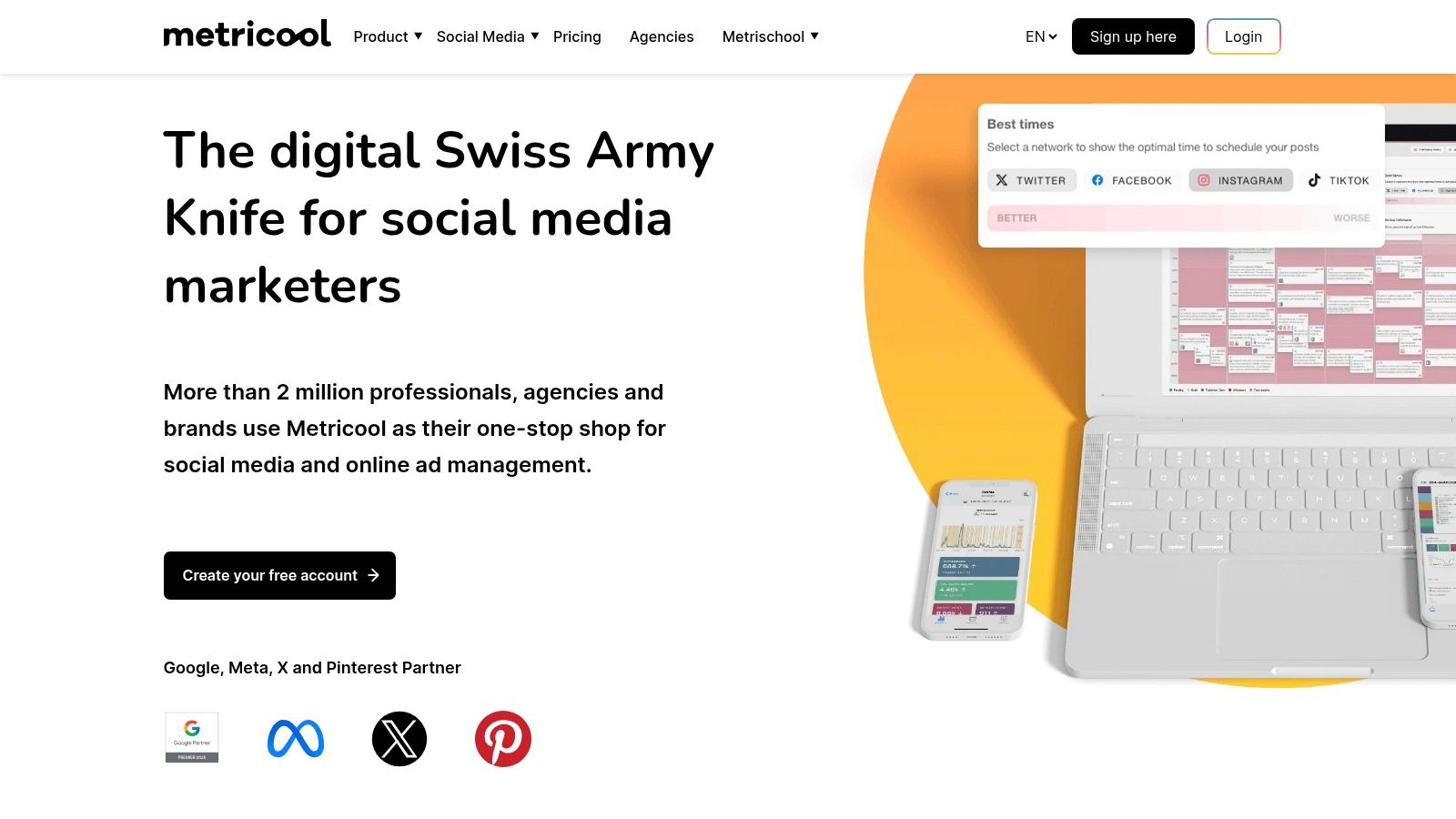
Where Metricool stands out is its brand-based pricing model and deep analytics capabilities, which are often reserved for more expensive tools. Features like detailed competitor analysis, hashtag tracking, and seamless integration with ad platforms (like Google and Facebook Ads) provide a holistic view of your digital presence. This focus on analytics makes it one of the best social media management tools for users who need to prove ROI and optimize campaigns with precision.
Key Details & Use Case
- Best For: Freelancers, agencies, and data-focused marketers who need robust analytics and reporting on a flexible budget.
- Pricing: A free plan is available. Paid plans start at $25 per month for the Starter tier, scaling up with the Advanced and Enterprise plans that add more brands and team features.
- Unique Feature: Its SmartLinks tool allows you to create a customizable link-in-bio page, complete with clickable buttons and links to your latest content, directly within the platform.
Pros:
- Flexible brand-based pricing is ideal for growing agencies.
- Generous analytics history and powerful reporting features.
- Easy onboarding and an intuitive user interface.
Cons:
- Connecting Twitter (X) data requires a paid add-on.
- Advanced automation and team approval workflows are gated in higher-tier plans.
Website: https://metricool.com
11. G2
While not a management tool itself, G2 is an indispensable resource for finding the right platform for your needs. It’s a comprehensive software marketplace that aggregates verified user reviews, allowing you to research, compare, and evaluate dozens of the best social media management tools based on real-world feedback. By leveraging its powerful filtering and comparison features, you can move beyond marketing claims and understand how a tool actually performs in practice.
The platform’s strength lies in its "Grid" reports, which visually map out market leaders, contenders, and niche players based on user satisfaction and market presence. This allows you to quickly identify top-rated options and see how they stack up against each other. For anyone conducting due diligence before committing to a subscription, G2 provides the critical social proof and unbiased insights needed to make an informed decision, saving significant time and reducing the risk of choosing the wrong solution.
Key Details & Use Case
- Best For: Marketers and teams in the research phase, comparing different social media management tools to find the best fit.
- Pricing: Free to browse and access reviews. The platform is supported by vendors who may pay for enhanced profiles or lead generation.
- Unique Feature: Its side-by-side feature comparison grids, which use data from verified user reviews to score specific functionalities like scheduling, analytics, and team collaboration.
Pros:
- Broad coverage with up-to-date user sentiment and reviews.
- Helps triangulate a tool’s usability and support reputation.
- Highlights trending, high-momentum, and easiest-to-use products.
Cons:
- Sponsored placements can influence visibility, requiring you to review multiple opinions.
- Review data may occasionally lag behind rapid product updates.
Website: https://www.g2.com/categories/social-media-mgmt
12. Capterra
While not a management platform itself, Capterra is an indispensable resource for finding the right one. It's a comprehensive software directory that aggregates hundreds of social media management tools, allowing you to filter, compare, and analyze your options based on user reviews, features, and pricing. This makes it an essential first stop for anyone trying to navigate the crowded market and create a shortlist of potential solutions.
The platform's true value lies in its granular filtering capabilities and verified user reviews. You can drill down by specific needs like "content curation" or "sentiment analysis" and then sort the results by user rating or number of reviews. This process helps you move beyond marketing claims and see how a tool performs in the real world for businesses similar to yours. For marketers conducting due diligence, Capterra is one of the best social media management tool directories available for making an informed purchasing decision.
Key Details & Use Case
- Best For: Marketers and businesses in the research phase, comparing features and user satisfaction across a wide range of tools.
- Pricing: Free to use for research. Pricing for individual tools is listed but should always be verified on the vendor's website.
- Unique Feature: Its robust comparison tool allows you to select up to four different software products and view their features, ratings, and pricing side-by-side in a detailed, easy-to-read format.
Pros:
- Vast directory with powerful filtering to quickly narrow down options.
- Authentic user reviews provide valuable, real-world insights.
- Excellent for discovering niche or newly emerging platforms.
Cons:
- Sponsored listings can appear prominently in search results.
- Pricing information can sometimes be outdated; always double-check with the vendor.
Website: https://www.capterra.com/social-media-management-software/
Top 12 Social Media Management Tools Comparison
| Platform | Core Features & Automation | User Experience & Quality ★ | Value & Pricing 💰 | Target Audience 👥 | Unique Selling Points ✨ |
|---|---|---|---|---|---|
| 🏆 EvergreenFeed | Custom content buckets, Buffer integration, randomized scheduling | ★★★★☆ Intuitive dashboard, proven time savings | Free signup, risk-free start 💰 | Professionals, teams, agencies 👥 | Automates evergreen posting, multi-account support ✨ |
| Hootsuite | Unlimited scheduling, AI captions, social inbox | ★★★★☆ Enterprise-grade, mature analytics | Pricing scales with users 💰 | Large teams, enterprises 👥 | Competitive benchmarking, strong workflows ✨ |
| Sprout Social | Smart Inbox, AI publishing, advanced reports | ★★★★☆ Easy administration at scale | Higher per-seat pricing 💰 | Cross-functional teams, customer care 👥 | Stakeholder-ready reporting, helpdesk integrations ✨ |
| Buffer | Visual calendar, first-comment scheduling | ★★★☆☆ Low learning curve, good SMB support | Transparent pricing, affordable 💰 | SMBs, creators, agencies 👥 | Simple UI, Canva & Drive integrations ✨ |
| Later | Visual planner, Social Sets, UGC tools | ★★★☆☆ Intuitive for IG/TikTok heavy users | Clear post-count limits 💰 | Visual platform users, influencers 👥 | Link in Bio, UGC collection ✨ |
| Agorapulse | Unified inbox, ROI reporting, team analytics | ★★★★☆ Strong moderation and reporting | Per-user pricing scales 💰 | Agencies, teams 👥 | Ad comment moderation, Google Analytics integration ✨ |
| SocialPilot | Bulk scheduling, white-label analytics | ★★★☆☆ Good ease of use, value for SMBs | Aggressive pricing for volume 💰 | SMBs, agencies 👥 | Unlimited users on top plan, simple add-ons ✨ |
| Loomly | Approval workflows, advanced analytics, integrations | ★★★☆☆ Visual workflows, client-friendly | Strong price-to-seats value 💰 | Growing teams, nonprofits 👥 | Slack, Canva integration, nonprofit discount ✨ |
| Zoho Social | Multi-brand publishing, smart scheduling | ★★★☆☆ Good SMB features, Zoho ecosystem | Affordable, varies by region 💰 | Agencies, SMBs 👥 | Zoho CRM & Desk integration ✨ |
| Metricool | Competitor analysis, unlimited scheduling | ★★★☆☆ Flexible pricing, useful reports | Brand-based pricing 💰 | Creators, small agencies 👥 | Competitor tracking, link-in-bio ✨ |
Making Your Final Decision: Which Tool Is Right for You?
We've navigated the complex landscape of the best social media management tools, from enterprise-grade powerhouses to nimble, specialized platforms. The sheer volume of options can feel overwhelming, but the journey to finding the perfect fit for your brand doesn't have to be a shot in the dark. The key is to shift your perspective from "which tool is the best?" to "which tool is the best for me?"
Your final choice hinges on a strategic alignment of your unique operational needs, team structure, and long-term goals. The tools we’ve explored, including industry giants like Sprout Social and Hootsuite and agile contenders like SocialPilot and Agorapulse, all excel in different areas. Your task now is to map their strengths to your specific requirements.
Recapping the Core Takeaways
The most crucial insight from our deep dive is that there is no single "best" platform for everyone. Instead, the market is segmented to serve distinct user profiles.
- For large teams and enterprises, the decision often comes down to platforms offering advanced team workflows, granular permissions, and sophisticated approval processes. Sprout Social and Hootsuite are dominant here, providing the security, in-depth analytics, and compliance features that large organizations demand.
- For small businesses and agencies, value and efficiency are paramount. Agorapulse and SocialPilot strike an exceptional balance, delivering robust scheduling, reporting, and engagement features at a price point that supports growth without requiring an enterprise-level budget.
- For visual-first brands and creators, the focus is on content planning and platform-specific optimization. Later’s visual planner and Linkin.bio feature make it an unparalleled choice for Instagram-centric strategies, while Buffer offers a clean, streamlined experience for straightforward scheduling.
- For the budget-conscious marketer or solopreneur, tools like Zoho Social and Metricool provide an impressive suite of features within a more accessible pricing structure, proving you don't need to break the bank for effective management.
Your Actionable Framework for Selection
Before you commit to a subscription, it’s vital to move from passive research to active evaluation. Hands-on experience is the only way to truly understand how a tool will integrate into your daily workflow.
Follow these steps to make a confident, data-driven decision:
- Define Your Non-Negotiables: Create a checklist of your absolute "must-have" features. Do you need advanced sentiment analysis? Is a unified social inbox critical for your customer service? Do you require a visual content calendar with drag-and-drop functionality?
- Set a Realistic Budget: Determine what you can comfortably invest per month or year. This will immediately narrow your options and prevent you from overspending on features you may not use. Remember to factor in the cost per user if you have a team.
- Shortlist 2-3 Contenders: Based on your feature list and budget, select the top two or three platforms from this guide that seem to be the best fit. Avoid the temptation to trial too many, as this can lead to decision fatigue.
- Execute a Real-World Trial: Sign up for the free trials of your shortlisted tools. Don't just explore the interface; use it for your actual social media tasks for at least a week. Schedule posts, pull a report, and respond to comments. This is the ultimate test of usability and effectiveness.
- Evaluate the Experience: At the end of the trial period, ask yourself and your team: Did this tool save us time? Did it provide new, valuable insights? Was the interface intuitive or frustrating? The answer will illuminate your final choice.
Ultimately, the best social media management tool is the one that empowers you to work smarter, not harder. It should feel like a natural extension of your strategy, automating the tedious tasks so you can focus on what truly matters: creating authentic connections and building a thriving community around your brand.
Ready to ensure your social media calendar is never empty again? While you're choosing a primary scheduling platform, consider automating your evergreen content with EvergreenFeed. It intelligently recycles your best-performing posts, keeping your audience engaged and driving continuous traffic without any extra manual effort. Learn how EvergreenFeed can become your secret weapon for consistent social media presence.



